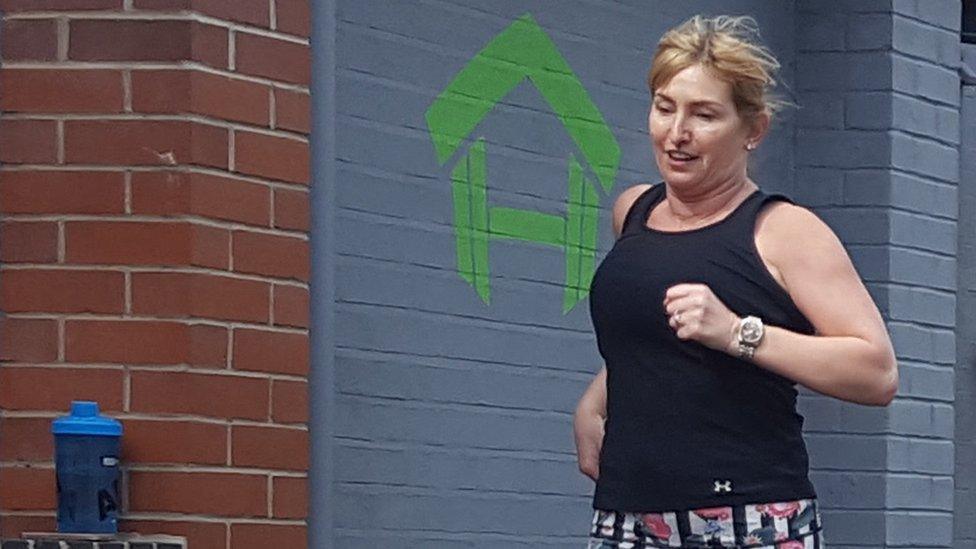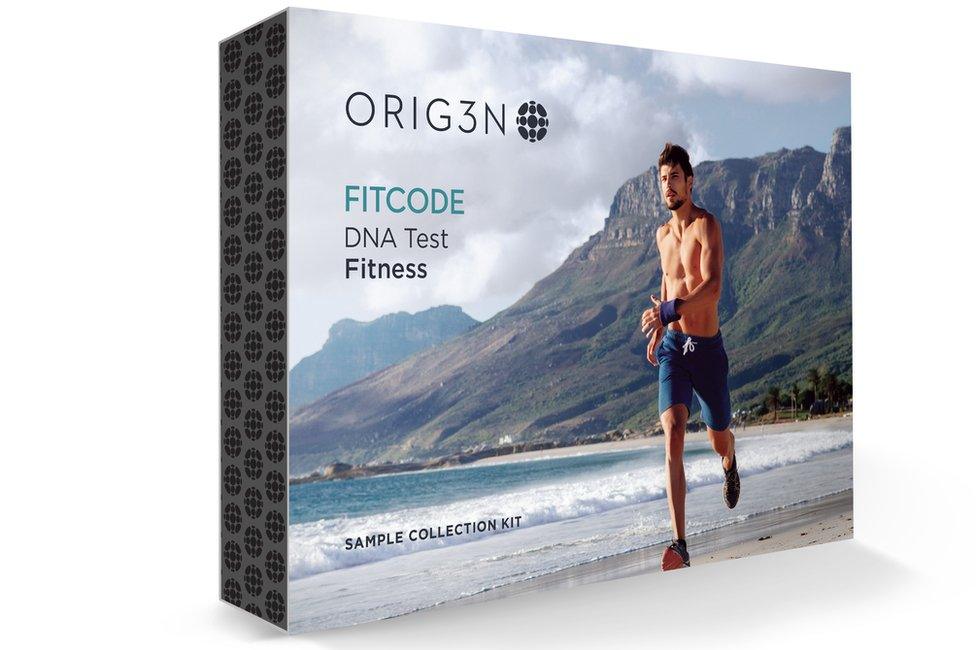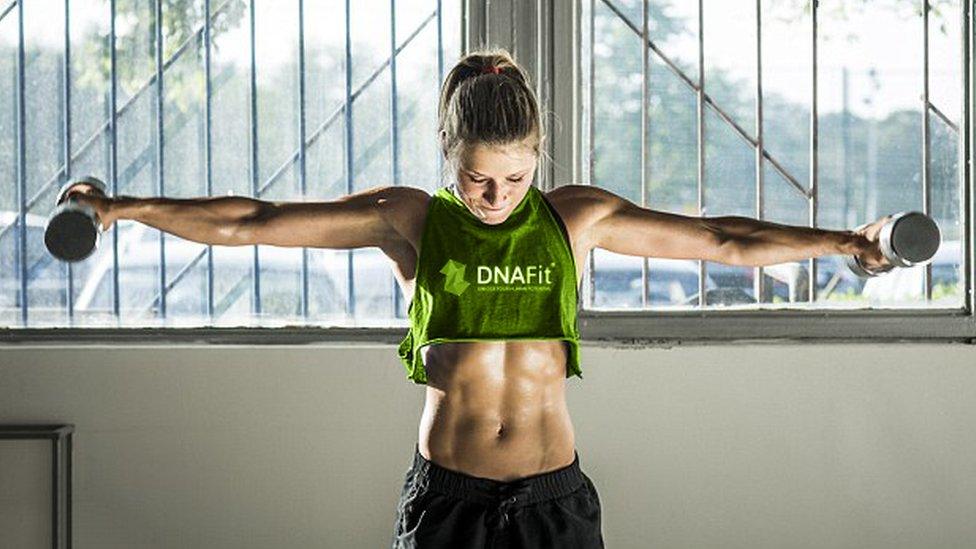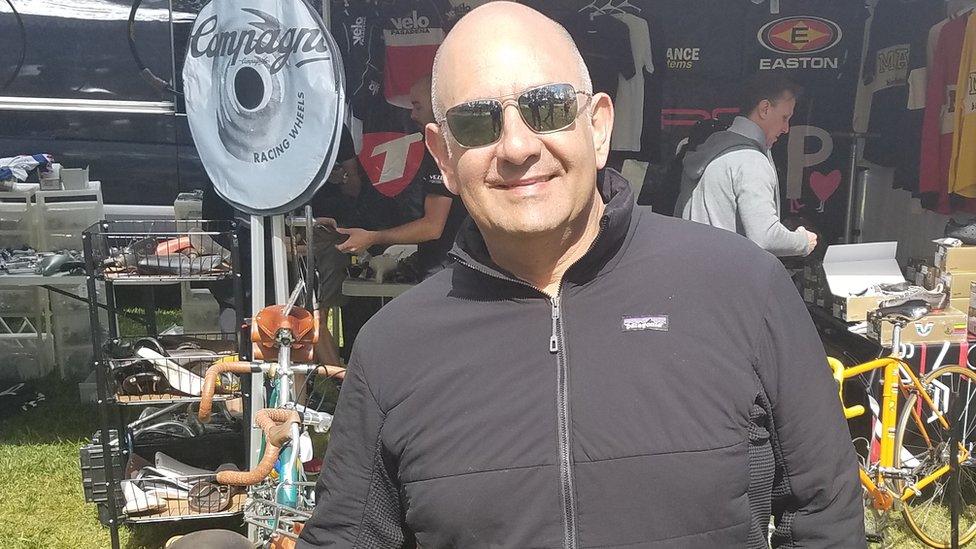How DNA-testing kits are becoming big business
- Published

Mandy Mayer, 56, thinks DNA-testing has helped her drop a dress size
The latest health and fitness trend involves taking a DNA test to find out more about how our bodies respond to different types of food and exercise. But how accurate and effective are these kits?
Fitness fanatic Mandy Mayer, 56, exercised several times a week but felt like she'd hit a plateau.
Her personal trainer suggested she try a DNAFit test, which tests the body's genetic response to key foods and exercise.
"I jumped at the chance," she says. "I thought I'd love to have that kind of knowledge."
After sending off a swab of her saliva, she received a report on her fitness and diet in January. She was impressed.
"I was like 'wow'. They told me I don't tolerate caffeine and refined foods very well, and I respond better to endurance training than anything else."
Three months later and she has dropped from a size 12 to a size 10 and lost several kilos. She attributes her leaner figure to understanding more about her genetic code.
"Without a shadow of a doubt it was down to the test," says Mandy, who lives in Market Harborough, Leicestershire.
"It's made me follow the right training and make little changes to my diet."
A growing number of start-ups, such as 23andMe, FitnessGenes, UBiome, DNAFit, Orig3n and Habit, are moving into this space, promising that mail-order genetic tests can change your life for the better.

Orig3n is one of a growing number of start-ups entering the DNA-testing market
Some researchers believe the global market for such kits could be worth more than $10bn (£7.7bn) by 2022.
But how do they work and how reliable are they?
Avi Lasarow, chief executive of DNAFit, explains that everything about who we are is the unique combination of what we are born with - our genetics - and how we live - our environment.
"The biggest 'environment' factor that we can control in our day-to-day lives is our diet," he says, "so by understanding more about the static part, the genetics, we can better tweak the bit in our control."
He gives the example of the CYP1A2 gene, which controls around 95% of caffeine metabolism.
"Some people are fast metabolisers, some are slow, depending on their variants of this gene. Once you know this, however, you can make a better informed decision on your caffeine intake than you could without your genetic data."
Robin Smith, chief executive of Orig3n, which offers a range of health and wellness DNA tests costing from $29 to $149, says the results can help people make educated choices about what works for their bodies.
"If a person's DNA suggests that she is more likely to be deficient in B vitamins, she can pay attention to that in her daily life.
"Knowing what your DNA says about your body's food sensitivities, food breakdown, hunger, weight, vitamins, allows you to become a more informed consumer.

DNAFit says its kits can tell us what type of exercise we should be doing
"You can become smarter about what you choose to eat, and smarter about what supplements you choose to buy, saving you time, energy, and money while getting the results you want faster."
So much for the sales pitch, but some genetic experts are concerned that the efficacy of such kits may be overhyped.
"I'm not against people being able to access genetic information about themselves if they wish to do so, provided the test results and limitations are clearly explained," says Dr Jess Buxton, a geneticist at University College London.
"However, I do think that the amount of useful information that personalised health tests can offer is very limited at present because we still know very little about the effect of most SNPs [genetic variations called single nucleotide polymorphisms] and other types of genetic variation on a person's health."
While there are a few conditions, such as lactose intolerance, for which the genetic variations are very clear and well understood, the same cannot be said for most other conditions, she says.
"These [genetic variations] interact with each other and with non-genetic factors in ways that we don't fully understand, so it's impossible to make accurate predictions based on information about just a few of the gene variants involved, as many of these tests do."
That said, some studies do suggest that this kind of analysis might work. For example, the University of Trieste and the IRCCS Burlo Garofolo Institute for Maternal and Child Health in Italy found that those following diet based on genetic analysis lost 33% more weight than a controlled group.
Some start-ups are not just relying on a person's genetic make-up to make their diet and exercise recommendations.
San Francisco-based Habit's home kit includes a series of DNA samples, blood tests and a shake to drink so that the company can measure how your body metabolises fats, carbohydrates and proteins.
"Unlike other at-home tests that measure DNA alone, Habit looks at how the entire body works together," explains founder and chief executive Neil Grimmer.

Thierry Attias found out that he needed to eat far more vegetables to lose weight
Habit, he says, measures more than 60 nutrition-related blood and genetic biomarkers, biometrics and lifestyle choices, to make personalised nutrition recommendations for each individual.
"Personalised recommendations should be based on your entire biology, not just your DNA," says Mr Grimmer.
One early adopter is Thierry Attias, president of Momentum Sports Group, a firm managing the UnitedHealthcare Pro Cycling team.
"Even though I cycle a few times a week, I carry an extra couple of pounds and I was curious to learn more about myself," says Mr Attias, who lives in Oakland, California.
He discovered that he's caffeine sensitive, his diet needs to include more plant-based food, and his body is slow at processing fats.
While Habit was still in testing phase, he opted to receive personalised ready-to-eat meals from the company for three days.
"An interesting thing happened," he enthuses. "I lost 4lbs (1.8kg) in a few days. I learnt portion size and how much more veg I needed in a serving."
In two months he has lost about 11lbs, he says.
But do we really need a testing kit to tell us to eat more vegetables and fewer fats as part of a healthy balanced diet - advice that has been around for decades?
You decide.
Follow Technology of Business editor Matthew Wall on Twitter, external and Facebook, external